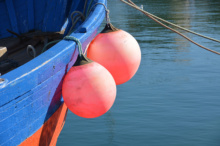La Palabra Del Día: "estribor"
estribor ( eh-stree-bohr' )
noun ( starboard side, starboard )
Welcome to La Palabra Del Día

There are many native English speakers here, most of us can offer great suggestions to the English sentences. I will do my best to go through them all, too. For the Spanish sentences, edit your posts according to the native Spanish speaker's suggestions. Use today's Word of the Day in your own Spanish sentence (and include the English translation as well). Try to use the word in a completely new way and vote on the sentences you like best. The winner will be chosen based upon the correct use of the word as well as the number of votes.
Guidelines:
Write sentences at least 5 words long, but don't write a paragraph either. Write your Spanish sentence, but include the English translation as well. Make the corrections suggested by other users and moderators in the comments section (try not to use personal pronouns unless absolutely necessary). Use your own words! (Don't use a translator, copy from a book, use song lyrics, etc.) Please keep political, religious or personal statements to a minimum. This is a practice game.

How to post a picture

Examples:
1: Hay dos boyas rojas en estribor.
There are two red buoys on the starboard side.
2: El capitán ordenó girar el barco 10 grados a estribor.
The captain ordered the ship be turned 10 degrees starboard.

12 Answers
Porque el viento está del babor, por favor vayan al estribor si se mareen.
Since the wind is from the port side, please go to the starboard side if you feel seasick.

Cinco compartimentos del barco Titanic se rompieron a lo largo de su costado de estribor.
Five of Titanic's compartments ruptured along its starboard side.

En una batalla contra los ingleses esta nave americana sufrió un balazo en estibor.
In a battle with the English this American ship took a shot on the starbord side.

Imagen histórica del lado de estribor del RMS Titanic a su paso por la Isla de Wight, después de salir del puerto de Southampton
Historic view of the starboard side of the RMS Titanic passing the Isle of Wight on leaving the port of Southampton

Después de romper una botella de champán sobre la proa de su nuevo yate para bautizarlo, tomaron una botella de vino en un lado del bote, y otra en el otro lado. ¿Puedes adivinar qué botella tomaron en el estribor?
After breaking a bottle of champagne over the prow of their new yacht in order to christen it, they drank one bottle of wine on one side of the boat, and the other on the other side. Can you guess which bottle they drank on the starboard side?


La major pesca es siempre fuera de la banda de estribor del barco.
The best fishing is always off of the starboard side of the boat.
Decimos "estribor" y "babor" para barcos, ¿por qué no se usan para coches?
We say "starboard " and "port" for ships, why aren't they used for cars?
Por mi parte no tengo la menor idea de las partes de un barco, porque soy una rata continental.
For my part I have no idea of the parts of a boat, because I'm a continental rat.
Hasta hoy me enteré de que los barcos y los aviones usan una luz verde del lado de estribor y una luz roja del lado de babor. De ese modo los pilotos saben si otra nave que viaja en la misma dirección se está aproximando o se está alejando. Estas luces deben estar encendidas durante la navegación nocturna.
Until today I learned that boats and planes use a green light on the starboard side and a red light on the port side. Thus the pilots know if another ship traveling in the same direction is approaching or moving away. These lights are required to be on during operation in night.


Hasta la estación espacial internacional utiliza terminos nauticos como estribor y babor.
Even the international space station uses nautical terms like starboard and port.
Puerto fuera el hogar de estribor.
Port out starboard home.
Folk lore has it that this is where the meaning of "P O S H " is derived.
Early travel by ship to India it was preferred to have a "port cabin out,
and a starboard one home because these were cooler.
The term starboard derives from the Old English steorbord, meaning the side on which the ship is steered. Before ships had rudders on their centrelines, they were steered with a steering oar at the stern of the ship and, because more people are right-handed, on the right-hand side of it. The term is cognate with the Old Norse stýri (rudder) and borð (side of a ship). Since the steering oar was on the right side of the boat, it would tie up at wharf on the other side. Hence the left side was called port.

Bumping












